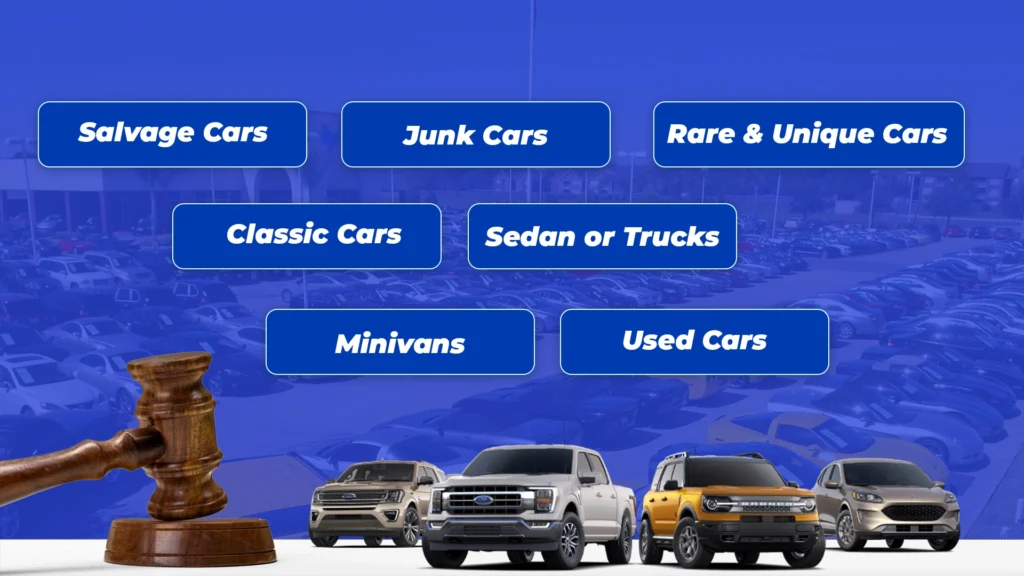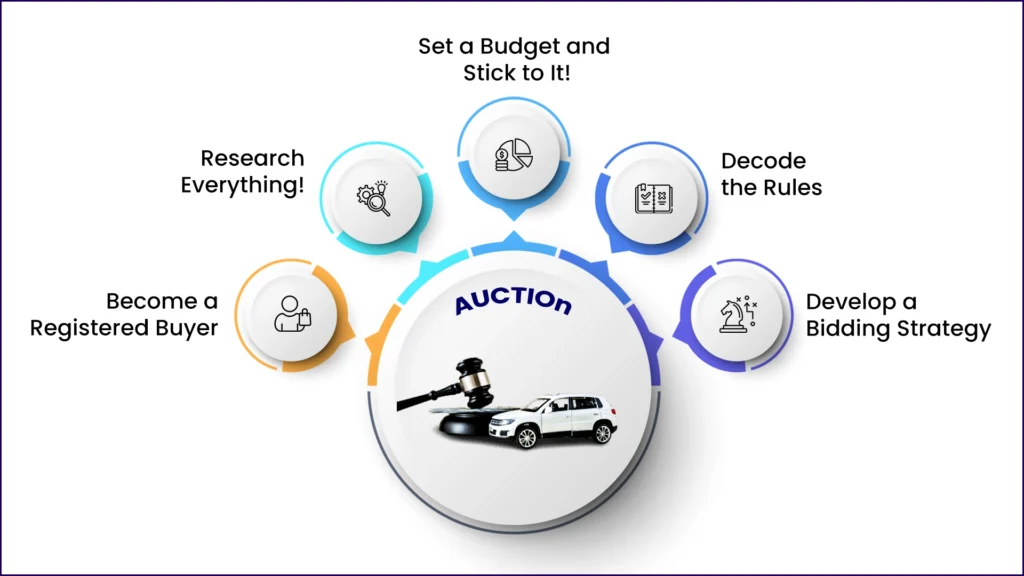Government car auctions are a unique opportunity for individuals and businesses to acquire vehicles previously owned by government agencies. These auctions offer a wide range of vehicles, from well-maintained options to those in need of repair. In this blog post, we’ll delve into how government cars auctions work, how to find them, essential rules and regulations to follow, and valuable tips for buying vehicles at these auctions. However, it’s crucial to recognize that while these auctions can be lucrative, they may not be the best option for amateur buyers due to the inherent complexities and risks involved.
What is a Government Car Auction?
A government Car Auction is referred to as a car auction where the government auctions various government-owned and seized cars each year in good condition or some are in average condition and may need to be repaired. A federal agency that owns the vehicles or cars organizes the auction for car sales. It is a public event or online platform where government agencies sell thousands of motor vehicles each year. These auctions provide an opportunity for individuals and businesses to purchase a wide range of vehicles that were previously owned by government entities, including federal, state, and local governments.

Types of Vehicles Available at Government Car Auction Online & Offline
There are many types of vehicles available at gov car auctions online or offline whether you are looking for a classic car, sedan, or truck, car government auction platforms have it all. Let’s explore the different options available:
1) Salvage Cars
These cars have salvage titles or accident histories, so these are listed as not for driving purposes but they can be used for buying or selling car parts at a very reasonable price.
2) Junk Cars
Junk cars are cars that indicate the vehicle sold as scrap basically they have no value and only can be used for specific car parts or any other component.
3) Rare & Unique Cars
These are the few cars that are rare or hard to find at any car auction but sometimes available at a retired government vehicle auction too.

4) Used Cars
These are those cars that are pre-owned or government second-hand cars. Buying such cars at the government car auction can benefit the buyers as they are available at a reasonable price.
Government car auction caters to a variety of vehicles that you can find at government auctions. Explore various models from different manufacturers including Chevrolet, Ford, Dodge, and more.
5) Classic Cars
These are a few rare classic cars and a subset of a broad category of collector cars. These are typically older or historical cars and are also known as ancient cars.
6) Minivans
These are vehicles that are designed to transport passengers in the rear seating rows with reconfigurable seats in two or three rows. You can find these cars at auctions conducted by government agencies.
7) Sedan or Trucks
In case you are looking for a truck and a sedan car, you may find these cars & trucks at the government car auctions.
How a Government-Seized Car Auction Works
The federal government agency holds auctions for vehicles it owns. Often, it hires an auction firm to carry out sales. On average government auctions thousands of vehicles every day and these automobiles belong to owners who are in debt to the government due to tax or loans, criminal activities, or more! Auctions may take place online, offline in person, or by mail in bid, But how do these auctions operate? Let’s delve into the workings of a government-retaken car auction. Here is an overview of how a government-seized car auction works:
Firstly you need to be 18years+ to participate in the auction. where identification will be needed to verify your eligibility. If you are not an adult, you must ask someone who can go on your behalf.
Some auctions require a license, especially for dealers. To obtain information about public auctions, locate them through government offices or auto magazines. For current seized auto auctions search directories, find updated information about these sources and once done, create a route for several auctions that include vehicles with high preference. Before attending the auction, please do some research.
Make sure you know the locations, times, and details about the cars in advance. Do not forget to bring along a competent mechanic so that they can help assess the condition of the vehicle on sight because any good quality part dealer knows this rule very well. Don’t forget to check out my blog for all upcoming auction listings!
How to Prepare for a Government Auction
As you know about government repo auctions, you will agree that every government auction has its own rules and regulations. There are a few things you can do to increase your chances of finding a great deal before you just dive right in.
1) Become a Registered Buyer
The first step you will need to register to participate in a government car auction. You will need to complete the registration form, which usually requires submitting personal details like bringing your photo ID and necessary documents such as ID and sometimes a deposit payment. Ensure you familiarize yourself with the unique registration procedures for the particular auction you want to participate in.
2) Research Everything!
Instead of investing in a task with a lot of uncertainties, devote your time to those items you choose to investigate. Do online searches on particular items to understand their worth.
Some of the government-run auctions are open for you to check them out. Therefore, seize this opportunity! Examine carefully to see if these items are in proper condition and note any defects that may be present.

3) Set a Budget and Stick to It!
Determine a spending cap and stay within it! The frenzy of bidding can be addictive, so always set a realistic budget for each item you wish to purchase, and remember to never exceed the limit you have set. Always keep in mind that there are other costs you need to consider, such as buyer’s premiums or transportation fees, when setting your budget.
4) Decode the Rules
All auctions function differently. This is important to know! Be sure that you comprehend the fine print about the auction, such as payment options, removal time limits, and any potential constraints.
5) Develop a Bidding Strategy
Your primary concern is to follow the financial plan and not to overpay because of the games played during auctions. Don’t worry, though – there will be other occasions for you to seize your trophy!
You can prepare yourself adequately to enter the world of government auction vehicles and come out triumphant with mind-blowing discoveries if you follow these processes!
Participating in Government Car Auctions
Scoring a car at government auction cheap car auctions can be a good way to find a bargain. But before you dive in, Let’s understand how you can participate in government car auctions. Let’s understand the process in detail:
1) Finding an Auction
If you’re interested in buying a government vehicle, then make sure to look for auctions of used cars that the General Services Administration (GSA) holds. Additionally, you can also find listings of seized vehicles on the US Marshals Service and Department of Treasury government car auction websites. If you happen to come across any confiscated vehicles, your local police department or sheriff’s office might hold auctions for them
2) Registering for the auction
Most registration procedures are varied, but there is often a part that deals with providing Identification proof, contact details along with a fee.
3) Things to consider
The cars that the government sells can be termed “as-is” since they do not give any warranty on whether they will drive or not, or if they provide exact mileage. Take into consideration the additional budget that may be required for probable repairs.
This is in connection with the buyer’s premiums and title transfer charges, among others; this will allow you to make an informed decision.
4) Online vs. In-Person
Even though these are gaining more and more attention, they save time but do not give a chance to look at the car in person. The method is lengthy yet excellent since it allows for vehicle inspection
How to Find a Government Auto Auction Near You
To find a government vehicle auction nearby you can do a relatively straightforward process if you know where to look. Here are some methods and sources to help you find government car auctions:
1) Local Police Auctions
Contact Your Local Police Department to find information about local police government impound auctions, the best approach is to call your local police department or visit their website. They can provide details on upcoming auctions, including dates, times, and locations.
2) Federal Government Auctions
General Services Administration (GSA): The GSA frequently holds auctions for surplus federal auction cars. You can find information about GSA auctions cars on their website. These auctions often include a wide range of vehicles used by government agencies.
3) Additional Government Sites
State car auction and local government agencies may also conduct auctions to sell surplus or impounded vehicles. Check the websites of your state and local government departments, such as transportation, revenue, or public safety, for information on upcoming auctions.
4) Private Sources
- Auction Websites: There are various websites that aggregate information about government auctions from different agencies. Websites like gov deal cars and public surplus cars list government surplus auctions from various organizations, including cities, counties, and school districts.
- Auction Houses: Some auction houses specialize in government vehicle auctions. These businesses may have physical locations where you can attend auctions, or they may conduct online auctions. Check for local auction houses that handle government vehicle sales.
- Auction Listings and Classifieds: Local newspapers, online classified ads, and community bulletin boards may have listings for upcoming gov auction vehicles. Keep an eye out for auction advertisements in these sources.
- Auction Apps and Services: Some smartphone apps and online services can help you find gov auction cars in your area. These tools may provide alerts and notifications for upcoming auctions based on your preferences.
When you find an auction that interests you, it’s essential to research the vehicles, inspect them if possible, understand the auction rules and fees, and come prepared with a budget in mind. Government car auctions can be competitive, so being well-prepared can increase your chances of securing a good deal on a vehicle.
Rules and Regulations at Government Car Auction
Here are the key steps and regulations for a government vehicle auction:
1) Vehicle Condition
All vehicles are sold in “as is” condition, with no guarantees of running condition or accuracy of odometer readings.
2) Viewing Period
Potential bidders can view vehicles on the Monday and Tuesday before the auction from 10:00 AM to 1:00 PM. Only military/CAC cardholders (Active Duty, Retirees, Dependents, Civil Service) are allowed to participate.
3) Bidder Registration
To participate, bidders must register and receive a bidder number. Registration is on the day of the auction. Registered bidders are responsible for their bids and must ensure the Certificate to Obtain Title is issued in their name.
4) Bidding Process
During the auction, bidders cannot bid below the government car auction fixed price (stated in Annexure-‘A’) or the highest written bid received. Bidding starts at noon, with verbal bids near the vehicle. All sales are final, and electronic devices are prohibited. The MWR Department can reject bids and resolve disputes.
5) Payment
Payment can be made in full on the auction day with cash or credit card. If not paid in full, a minimum deposit (typically $20 or 10%) is required, with the remaining balance due within five working days. The Certificate to Obtain Title is issued upon complete payment.
6) Late Payment
Failure to make full payment within five working days results in a null and void sale, deposit forfeiture, and potential re-offering of the vehicle in the next auction.
7) Vehicle Removal
Vehicles must be fully paid for before removal. All vehicles must be towed off the lot, and buyers have five working days to do so. Failure to remove the vehicle within this time can result in storage charges and eventual towing.
Car Auctions for Non-Dealers
A lot of non-dealer auctions are available. Below is an inclusive list of car auction events that are accessible to everyone including non-dealers: National Online Auction Sites:
1) Copart: Copart is among the major companies in the industry that open its online auction gates to members of the general public. More importantly, you can browse for “No License Required” cars of choice that require no dealer license for bidding.
2) ADESA: Though several ADESA sales are restricted to dealers alone; there are others that serve both dealers and general pub
3) The company namely Capital Auto Auction is noted for the fact that it deals in public online car sales. It has forwarded a vast range of vehicles that include repossessions, and dealer consignments among others.
Additionally, local auction houses are known for public car sales. One can easily identify them by either visiting the internet or local newspaper classifieds.

Buying Advice for Vehicles at a Government Auction
Here are some valuable tips for navigating government auctions successfully, from researching government car auction sites to checking vehicle details. To make the most of government auctions when buying vehicles, follow these essential tips.
Research Government Auction Sites: Find reliable sources for government auctions, such as official government websites or reputable auction companies. Know the auction dates, locations, and types of vehicles available.
Consider Market Value: Research the market value of the type of vehicle you’re interested in to determine a fair price. This will help you set a realistic budget.
Set a Budget: Determine how much you’re willing to spend, factoring in potential repair costs. Stick to your budget to avoid overbidding.
Car’s Condition: Ensure to check the condition of the car as every car’s condition depends on the car itself a few cars may have easy and others may not because of factors such as mild climate, high mileage, busy traffic & more!
Choose a Payment Method: Understand the payment methods accepted at the auction, whether it’s cash, credit card, or other options. Have a suitable payment method on hand.
Avoid Emotional Attachments: Don’t become too emotionally attached to a particular vehicle. Be open to multiple options and be ready to walk away if the bidding goes beyond your budget.
Check the VIN Number: Verify the Vehicle Identification Number (VIN) to ensure the vehicle’s history, title, and any potential issues are known. You can use this to make an informed choice.
Additionally, attending a government auction in person or participating in online auctions may require different strategies. Always read the auction’s terms and conditions, and consider getting a pre-purchase inspection if possible to assess the vehicle’s condition.
How to Find Car Auctions with No Damage
As there is no particular auction specific for cars with no damage, you can find clean title cars at auctions. You can search for auctions with clean title vehicles. The particular has not been involved in any major accident & does not have any damage that is reported. Multiple auctions sell cars with such a condition like, Copart, Manheim & IAA. Ensure to look for auctions that provide detailed information vehicles such as descriptions & photos. The reputable auctions do provide the detailed vehicle description and photos.
The best way to find cars with no damage, do an inspection of the vehicle in person this will ensure the condition of the car that is free from damage.
Best 10 Tips For Buying a Vehicle at Government Car Auction
Navigating government car auctions requires careful consideration and preparation to ensure a successful purchase. Here are essential tips to follow:
1) Assess Your Mechanical Abilities
Know your skills and tools. Don’t take on car repairs that are too tough for you.
2) Conduct Visual Inspections
Thoroughly examine the vehicle for signs of repairs or damage, using all senses to detect any issues.
3) Beware of Cosmetic Fixes
Assume that vehicles may have undergone cosmetic touch-ups to mask underlying problems, especially at public auctions.
4) Verify Vehicle Identification Numbers (VIN)
Check the VINs in different places on the car. They should match. If they don’t, there might be a problem like past accidents.
5) Check Fluids
Inspect the car’s oil and transmission fluid. Clear fluids usually mean the car has been well cared for.
6) Research Market Values
Use the internet to find out how much the car is worth. Don’t pay too much.
7) Understand “As Is” Condition
Acknowledge that cars are sold “as is,” with no warranties included. Prepare for unexpected problems.
8) Observe Auction Dynamics
Visit auctions to learn about bidding habits. Avoid suspicious activities.
9) Avoid Overbidding
Set a budget and stick to it, resisting the temptation to overbid or become emotionally attached to a particular vehicle.
10) Utilize Professional Assistance:
Consider bringing a professional
Do’s and Don’ts for Government Car Auction Purchases
Here are some dos and don’ts of buying at a government car auction:
Do: Bring a Mechanic
Do bring a qualified mechanic with you to the auction if possible. They can inspect the vehicles for any hidden issues or problems, which can save you from making a costly mistake. This is especially important since most auctioned vehicles are sold “as is,” without any warranty.
Do: Show Up Early
Do arrive at the auction early. This will give you time to register, inspect the cars, and review the auction rules and procedures. Being early also allows you to spot the vehicles you’re interested in and do some research on them.
Don’t: Get Attached
Don’t get emotionally attached to a particular car. It’s easy to get carried away in the excitement of an auction, but it’s essential to set a budget and stick to it. Avoid overbidding or making impulsive decisions based on your emotions.
Don’t: Forget to Check the VIN Numbers
Don’t forget to check the VIN (Vehicle Identification Number) on the vehicle. This is crucial for verifying the car’s history, including any accidents, title issues, or recalls. Make sure the VIN on the car matches the VIN on the title and other documents.
Why Should Amature Buyers Avoid Government Car Auctions?
There are a few reasons why amateur buyers should avoid gov car auctions:
1) Government-seized cars are often sold “as is.” This means that the buyer is responsible for any repairs or maintenance that the vehicle may need, regardless of the cost, and amateur buyers can’t inspect cars thoroughly. Amateur buyers may not have the expertise to identify potential problems with a car, which could lead to costly repairs in the future.
2) Government-seized cars may have liens against them. This means that the buyer may need to pay off the liens before they can register the vehicle. Amateur buyers may not be aware of how to check for liens or how to pay them off.
3) Government seized cars may have a history of crime or accidents. It is important to research the vehicle’s history before bidding on it. Amateur buyers may not know how to research a vehicle’s history or what to look for.
4) Government car auctions can be competitive. Experienced buyers often know how to navigate the auction process and how to get the best deals. Amateur buyers may be at a disadvantage when bidding against experienced buyers.
If you are an amateur buyer, it is best to avoid government-seized car auctions. Instead, consider buying a car from a reputable automotive dealership or from a private seller. You can also hire a mechanic to inspect any car that you are considering buying, regardless of where you buy it from.
Post-Auction Procedures
Once you have won the government auction car, the finalizing of buying it and taking ownership begins. Here is what to expect:
1) Usually auctioneers contact winners with guidelines on what to do next. This may include putting a signature on some papers or just paying.
2) Sometimes, the sale may be denoted as “Sold Subject To” (SST). This implies that there might be extra approvals that will have to be sought before the sale is complete. Ensure that you have all relevant documentation at hand.
3) Most auctions charge a buyer’s premium in addition to the final bid price. This refers to a payment made by an auctioneer for doing their job Be sure to consider this when setting your highest offer and working within your budgetary constraints.
4) You would have already paid part of your Earnest Money Deposit which is usually credited towards the ultimate purchase cost. The way it is used specifically will be provided in the auction terms.
5) You might be required to show proof of funds indicating that you can settle the remaining balance on the article. It could take the form of a bank statement or a letter from a bank offering credit facilities.
Conclusion
Gov auto auctions can be a fantastic opportunity to acquire vehicles at competitive prices, but they come with complexities and risks that may not be suitable for amateur buyers. It offers a diverse range of government auction vehicles, from well-maintained options to those in need of repair. To make the most of government auctions, it’s crucial to do your research, set a budget, and avoid getting emotionally attached to a particular vehicle.
Remember the dos and don’ts: bring a mechanic, arrive early, and check the VIN numbers. But if you’re new to the game, it might be best to steer clear of government car auctions and opt for more straightforward purchasing options, like buying from reputable dealers or private sellers. Safety and informed decisions should always be a top priority when venturing into the world of gov auto auctions.






